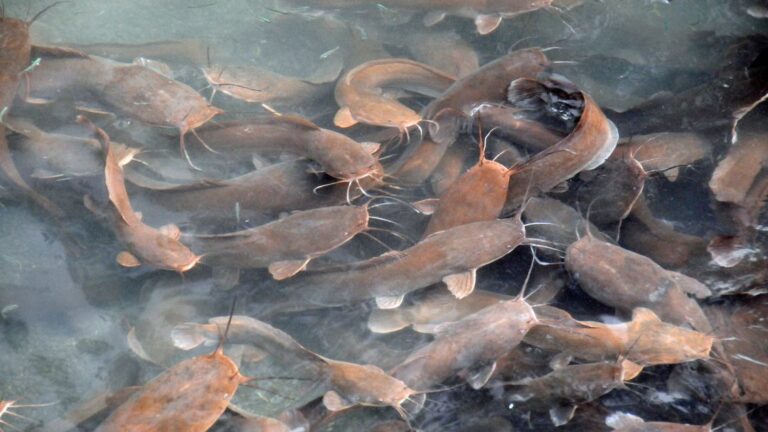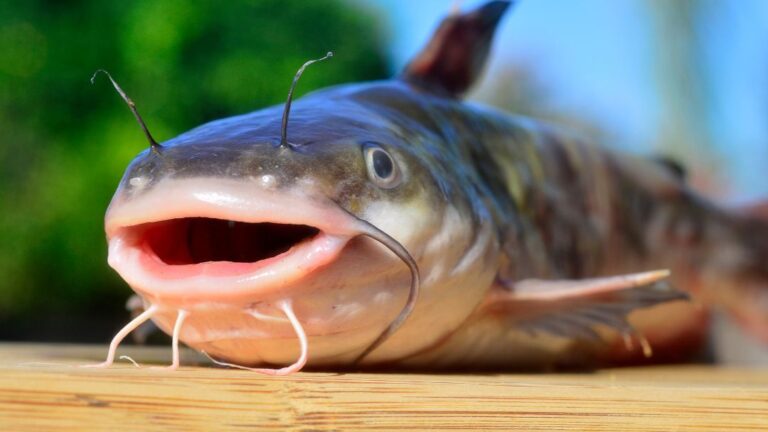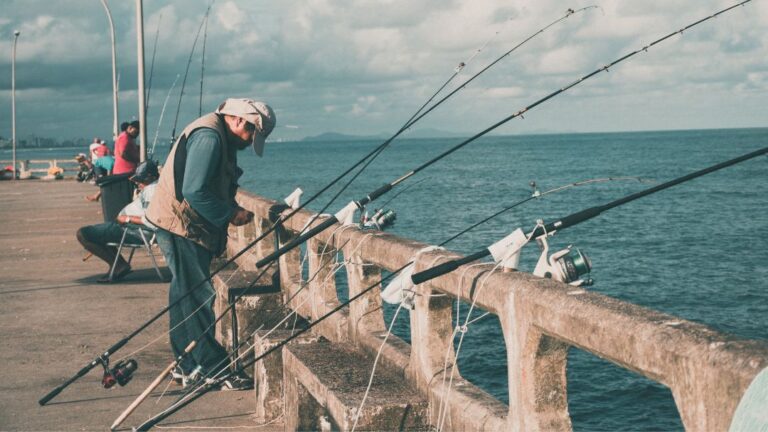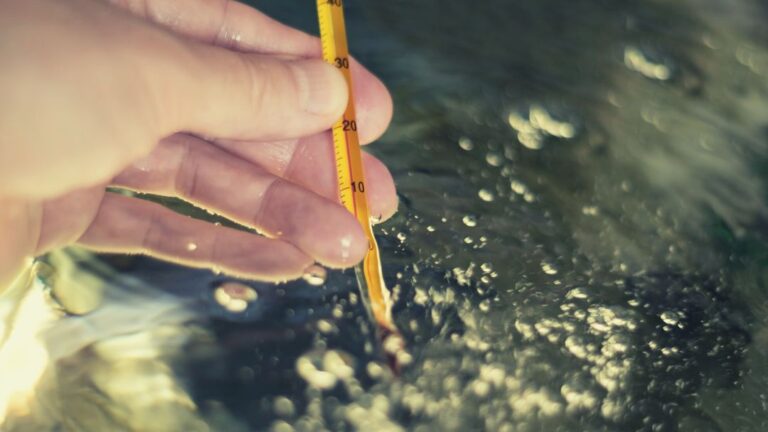Why Fishing Hooks Rust Out And How To Tackle It
The average lifespan of a fishing hook can be anywhere from a few months to several years. You may have to change your older fishing hooks when the point is no longer sharp. But sometimes, this tiny hook may get damaged quickly from rust or corrosion.
Why do fishing hooks rust out? Fishing hooks usually have rust or corrosion when exposed to excessive moisture and salt. Poor quality fishing gear is vulnerable to rust development. Not properly cleaning and drying them can also cause this problem.
What Causes Fishing Hooks To Rust Out Faster?
Unless you use a rustproof fishing hook, this tiny fishing gear will rust out after a certain period.
However, premature formation of rust in the fishing hook body may occur for the following reasons.
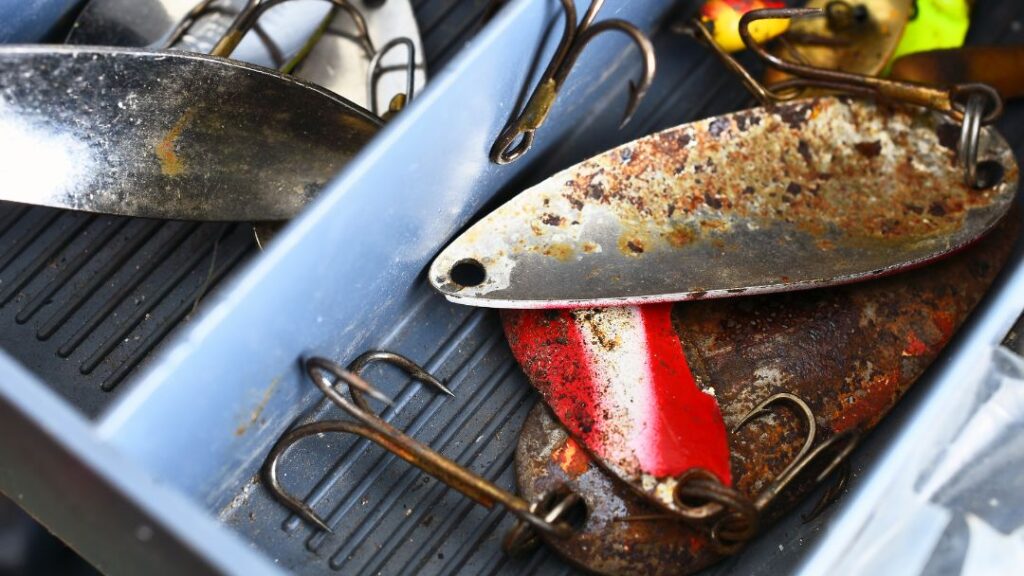
01. Exposed To Moisture
Rusting is an oxidation reaction. When a fishing hook is exposed to highly humid air, it will corrode faster.
Moisture can be in the form of dew, rain, or condensation. The metal surface of the fishing hook reacts quickly when oxygen and electrons get contact with moisture-saturated air.
Rust is mainly a combination of iron, water, and oxygen. It ultimately develops hydrated iron (III) oxide.
02. Exposed To Salt
Do you fish in saltwater for an extended period? This can be one of the primary reasons for a faster rusting process. It works as an electrolyte.
When the fishing hooks are exposed to salty water for a prolonged time, the metal (iron) starts losing electrons swiftly.
If you don’t remove rust on time, the chemical process called oxidation will work faster and damage the fishing hook quickly.
03. Cheap-quality Hooks
Have you purchased a good-quality fishing hook? Poor quality fishing hooks don’t have a thicker coating or plate.
The coating gets thinner within a short period. It fails to protect the hook surface from moisture. This causes rust development within a short period.
How To Remove Rust From Fishing Hooks?
Just because your fishing hooks have some rust doesn’t necessarily mean you will immediately buy a pair of new fishing hooks.
At least try removing the rust from this tiny gear first. The best part is that most items are already in your home.
Here, we will mention some DIY methods to remove rust from fishing hooks effortlessly.
Method 01: Baking Soda
One of the most popular options is using baking soda. Baking soda is a mild abrasive and a natural cleaning agent. It is readily available and cost-effective.
If your fishing hooks have light rust, it is a perfect option to try. Baking soda can neutralize any acidic compound that contributes to rust formation.
Grab a small container. Add one cup of baking soda and a tiny amount of water. Stir it until it dissolves in water and creates a thicker paste.
Then apply the solution to the vulnerable areas. Keep it for at least 3-4 hours. It will break down the rust and loosen it from the metal surface.
Remove the paste using a paper towel carefully without making dirty the surrounding area. You can apply it several times if the rust is too strong.
Method 02: Lemon Juice And Salt
Another effective solution is a mixture of lemon juice and salt. They have some rust removal properties.
First, sprinkle a small amount on the hook surface. Then, squeeze lemon juice on top of it. Keep it sit for 1-2 hours.
Don’t keep it for too long. Otherwise, it might cause damage. Use the lime to scrub off the rust from the hook surface.
Place the fishing hook on the running water and clean it properly for a few seconds. Use a paper towel to remove moisture from the fishing gear.
Let it dry properly. If you have a fishhook sharpening Whetstone, run it over the hook a few times to restore the hook’s sharpness and improve its performance.
Method 03: Apple Cider Vinegar
Apple cider vinegar or white vinegar is another affordable solution that can effectively dissolve rust and other types of corrosion from fishing hooks.
They have acetic acid that will weaken the corrosion on the fishing gear surface.
Grab a small container. Refill it with apple cider vinegar or white vinegar. Then, soak the fishing hooks in the container.
If the fishing gear has too much rust, it is best to soak it overnight. After soaking, you can use a soft-bristled brush or cloth to scrub away any remaining rust gently.
Place the fishing hook on the running water and clean it properly for a few seconds. Use a paper towel to remove moisture from the fishing gear.
Let it dry properly. If you have a fishhook sharpening whetstone, run it over the hook a few times to restore the hook’s sharpness and improve its performance.
Method 04: Potatoes
Which households don’t have potatoes? Everyone does! How about using this simple vegetable for removing rust from fishing hooks?
Potatoes contain oxalic acid, which has rust-removing properties. To make it more effective, add a small amount of salt or baking soda to the potato.
Make sure to peel off the spud before adding salt. Then cut the potato in half and rub the cut side onto the rusted hook area.
Alternatively, you can create a potato and salt paste and apply it to the rusted area of the hook. Let it sit for one-two hours.
Place the fishing hook on the running water and clean it properly for a few seconds. Use a paper towel to remove moisture from the fishing gear.
Method 05: Sandpaper
Do you have a few pieces of sandpaper lying around in your house? Why don’t you use them to remove rust from the fishing hook?
First, use medium-grit paper cautiously without adding too much pressure. Then, use fine-grit paper to give a final touch.
Rub the sandpaper on all the rusting areas carefully without leaving any spots behind. Don’t over-sand. Otherwise, it will leave scratches or cause other types of damage to the hook surface.
Make sure to clean the fishing hooks after a few minutes of sanding. It will help you figure out how much rust is removed. You can keep a soft towel or fabric to clean the sanding substances.
How To Protect Fishing Hooks From Rust?
The followings are the pro tips to keep your fishing hooks safe from rust.
01. Buy High-quality Fishing Hooks
Don’t expect cheap-quality fishing hooks to last as long as top-quality options.
Try to buy rustproof fishing hooks. They might be a bit expensive but worth the investment in the long run.
This type of high-quality fishing gear is made of stainless steel or high-carbon steel with a protective coating or plating.
Water, salt, and other corrosive substance will cause no or minimum harm to rustproof fishing lures.
02. Clean and Dry The Fishing Lures Before Storing
Make sure to adequately clean the fishing lures and hooks on the running water to make them entirely fresh. Then, dry the fishing hooks and lures before storing them.
There might be some damaging debris or chemicals on top of the fishing hooks.
If not appropriately dried, some moisture in the fishing gear will gradually cause rust formation.
Besides, storing wet or damp hooks can cause them to stick together or become tangled, making them difficult to use or even unusable.
03. Take Care Of Your Tackle Boxes
Anglers store various types of fishing gear in tackle boxes. Some of this fishing equipment may contain moisture. They might not be noticeable to the naked eye.
Spray a small amount of vegetable oil inside the tackle boxes to create a barrier between the metal surfaces and moisture.
Alternatively, you can use WD-40 to provide temporary protection to fishing hooks against rust. Keeping a few toothpicks is also effective, as they absorb moisture from the fishing gear.
But if you have a reasonable budget, we recommend using 2-3 Silica dry-gel packets. This gel is desiccant. It can absorb moisture from the surrounding area quickly and thoroughly.
04. Store Your Fishing Gear In A Clean And Dry Place
Your job doesn’t end after cleaning and drying the fishing hooks. Your responsibility is to store them in a clean, dry, and well-ventilated environment.
Ensure dirt, debris, and other contaminants don’t touch fishing equipment.
Keeping fishing gear in a highly moisture-based or damp environment will trigger a rust formation process.
The fishing hooks will remain sharp for a prolonged time. This will promote a longer lifespan for your fishing gear.
Summing UP
Preventing rust on fishing hooks is crucial to ensuring the longevity and effectiveness of your fishing gear. Rust can weaken hooks, make them brittle, and cause them to break, leading to frustration and disappointment on your fishing trips.
You can follow our above-mentioned guidelines and tips to protect your hooks from rust and corrosion. So, why risk losing that big catch due to rusty hooks? Take the necessary steps to protect your gear and enjoy a successful fishing trip every time.


